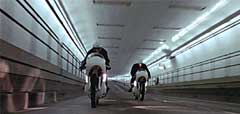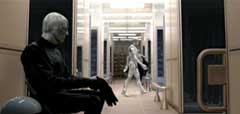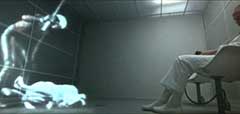I’ve always had a taste for dystopias.


I find tales of bleak alternate realities and possible futures fascinating. Some people find them depressing, but I find them inherently filled with hope. I like to believe that I would be that lonesome sole, able to shake off the shackles of the oppressors.
Here are just a few of my favorite dystopic stories: We, Anthem, The Dispossessed, Nineteen Eighty-Four, Planet of the Apes (the book is superior to either film adaptation), The Handmaid’s Tale, The Children of Men, On the Beach, The Wild Shore, The Quiet Earth, Mad Max, The Island. (Note: I realize I’m using the term dystopia broadly here to include post-apocalyptic scenarios. These two sub-genres share features I find appealing.)


It’s time to add a new title to this list: George Lucas’ first film, THX 1138, from 1971. It’s brilliant.
I’ll admit at the outset that this film is not for everyone. In fact, it’s probably not for many people. It’s strange. Much of it is observational rather than plot-driven. But wow is it intriguing.
THX 1138 (Robert Duvall) lives in a vast underground city. The residents of this city — who may or may not be clones — are bald, sedated, and dull. THX works in a cyborg factory, installing radioactive brains. When he returns to his apartment, he watches holographic pornvids and, covertly, falls in love with his roommate, LUH 3417. (As with many dystopias, sex is a crime in this world.)
When LUH becomes pregnant, the pair is imprisoned in a vast white emptiness with other deviants. (This section reminds me of a Star Trek episode, the name of which escapes me.) This part of the film feels very experimental, like Rosencrantz and Guildenstern are Dead. With bald people. LUH is killed. THX escapes with the help of two other prisoners.


The final part of the film is an extended chase sequence though the underground city. While not particularly exciting (The French Connection, released a few months later, featured a better chase), it’s visually striking. THX eventually escapes when the budget for his recapture is excited. He climbs from a hatchway to the world above. (A scene which, I now recognize, has been used many times in subsequent films.)
I liked THX 1138. The story is difficult to follow at first, but gradually becomes more clear. Because it’s an observational film (kind of like Altman’s stuff), most people would not enjoy it. But the cinematography is beautiful, and the movie is filled with ideas. I also like that much of the Star Wars aesthetic can be found here, six years earlier.


And now George Lucas brings us crap like Attack of the Clones.
(For a full review, check out Alexandra DuPont’s take. She likes it too.)

All great flicks! I love all of them but don’t forget ‘Soylent Green’. (don’t let Charlton Heston’s acting scare you). Scary how the planet sometimes seems to be getting closer and closer to parts of that scenerio.
Anthem is one of my favorites as well.
What is it with Charlton Heston and dystopian/post-apocalyptic movies?! He also starred in Omega Man (only survivor of biological war – the remaining folks are all daylight fearing zombies, natch).
Whenever I think of dystopian futures in the movies, I always think of Terry Gilliams Brazil and also 12 Monkeys. Of course, Ridley Scott’s Blade Runner is another great film that fits that genre.
Referring to Omega Man have you ever read the short story that the film is based on? Its Richard Matheson’s “I Am Legend“, which coincidentally is being ruined by Hollywood as we speak in a remake with Will Smith in the lead. I say ruined because well, you saw what they did to “I Robot?
Real quick note. Ridley Scott not only directed the dystopian Blade Runner but also the even more dystopian “1984” Apple Macintosh commercial!
Regarding “climing up a hatch to the world above” scenes, there’s a classic one in an H.P. Lovecraft short story, too — “The Outsider”. Except in that one, the protagonist’s been dead for some time (though he’s unaware of this, his memory gone), and when he escapes his lower domain, it’s his corpse that rises. Good times.